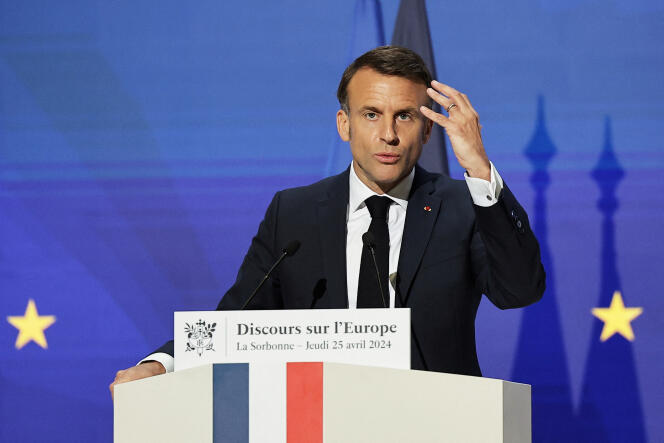


"Europe can die," French President Emmanuel Macron emphatically declared during a live broadcast from the Sorbonne university's grand amphitheater in Paris on Thursday, April 25. Returning to the same venue where he first spoke seven years ago, he shared his vision for the European Union (EU). The president did not hesitate to dramatize the issues at stake, describing a Europe whose fundamentals are under attack. He pointed to the war in Ukraine taking place on its border, the US-China rivalry that risks marginalizing it, the global rivalries intensified by climate and digital transitions and the increasing "attacks on our liberal democracies."
"To enable Europe not to disappear," continued Macron, "we need to respond with power, prosperity and humanism." For two hours, he tried to illustrate his point through a mixture of emphatic statements and concrete proposals. However, it remains to be seen whether they will ever become reality. It was a way of entering the campaign in his own way while pretending to ignore the electoral stakes, at a time when opinion polls for the European elections on June 9 are alarming for his camp.
The head of state did, however, allude to the French far right, which is leading the polls and is said to be threatening Europe from within. Since Brexit, he pointed out, "nobody dares to propose exits, either from Europe or from the euro." Going forward, the Rassemblement National (RN) and its nationalist friends have another agenda, which Viktor Orban, the Hungarian prime minister, summed up. "Occupy Brussels" to bring "change to the European Union ourselves," he said. Then, warned Macron, "Europe may die of its own accord, through a kind of trick of history."
After "Sovereign Europe" in 2017, the president is now arguing for a "Powerful Europe" – a concept hitherto considered very French among the EU 27. He suggested "bringing about a credible defense of the continent," based both on "the European pillar of NATO that we are in the process of building," but also on "a European defense framework." To this end, Macron proposed "a European defense initiative" to draw up a "common strategy" over the coming months, and then define the armaments the Union needs to equip itself with.
The president once again suggested making France's nuclear weapons available to the 27 member states, whose deterrent capability "is therefore an essential element in the defense of the European continent." However, he stopped short of proposing that these countries share the authority to push the nuclear button. It also opened the door to a continental anti-missile shield, which Paris forcefully rejected when Berlin proposed it within the NATO framework, shortly after the start of Russia's invasion of Ukraine.
You have 64.36% of this article left to read. The rest is for subscribers only.
